
Which Benchtop Product is Right For You in 2019?
No matter what the type of look you are after, there is a style or pattern to suit. With the development in production and the quality of the different types of materials we are seeing from all over the world, at a more affordable price point (For most materials) than ever, there’s never been a better time to be choosy about the right type of kitchen bench top material for your project.
Whether it’s an industrial, rustic, modern, or contemporary look that you’re after, there’ll be a bench top to suit. While we often consider what’s going to look good, there are other important factors such as budget and ease-of-cleaning that shouldn’t be overlooked to ensure your kitchen becomes a real focal point of your home, without the stress.
Are you looking for something that’s easy to maintain, or simply something that looks good? Are you after something more affordable to stand the stress of everyday life or something that becomes to a focal and talking point of your home, with a little more upkeep?
Well wonder no more friend, because we compared five of the most popular styles for you below.
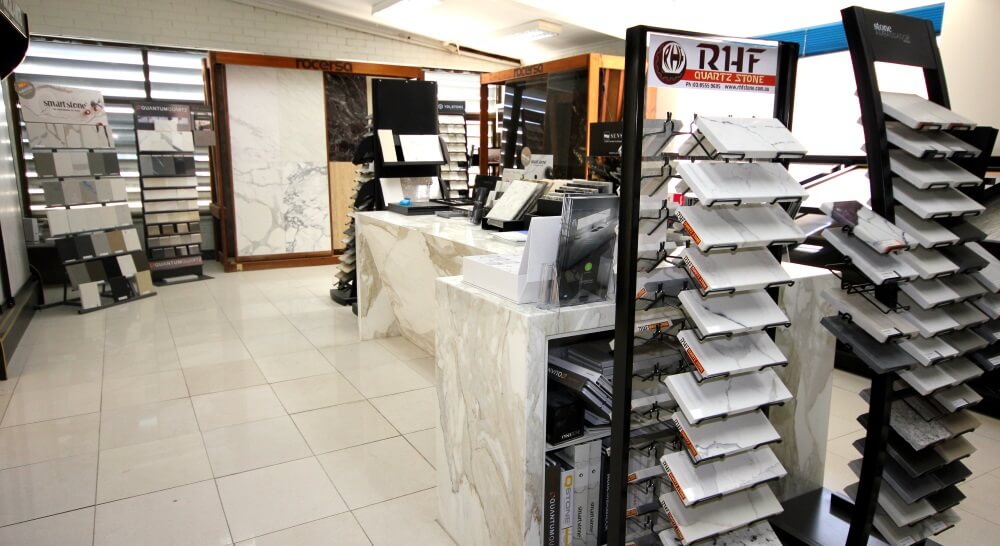
Did You Know We Have over 200+ Different Colours of Stone to Choose From At Our Display Gallery..?
1/ Sealed Granite – Exceptionally Hard & Durable
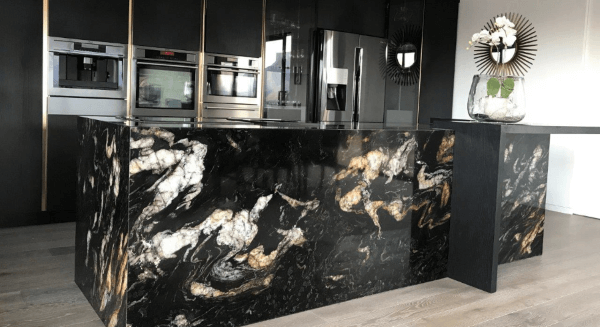
1/ Sealed Granite

If you want your kitchen to have all the bells and whistles and your budget allows it, natural stone like granite is a great option for your bench top. It’s extremely durable and will be a life-long feature in your home. For those who are looking for something a little more rugged and durable for your kitchen bench top granite is a great choice not only for indoor
Granite performed excellently in all tests except for the abrasion test where it scored very well. Scratch marks were only visible under light. It’s a porous material so it’ll need to be sealed to give it stain
THE PROS OF GRANITE:
- Exceptionally Hard & Durable
- Long-Lasting
- Looks great
- Can be used outdoors (BBQ Surround or outdoor kitchens for example)
THE CONS OF GRANITE:
- Not the most cost effective product
- Some styles can be harder to work with compared to quartz
- Styles don’t vary as much as quartz, marble and porcelain
Price: $$$$
Durability: 9/10
Ease of Maintenance: 9/10
2/ Laminate – For the Budget Conscious
2/ Laminate
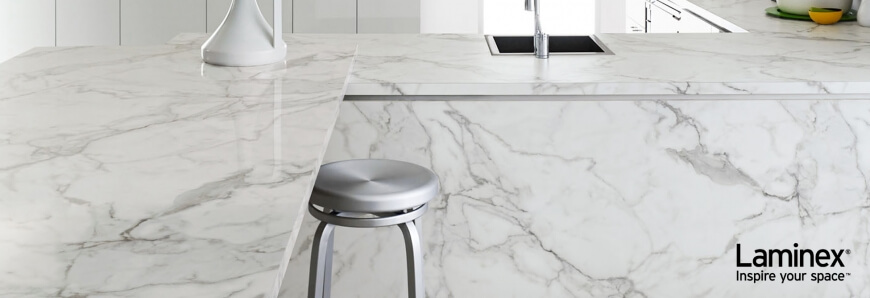

Laminate Kitchen Benchtop coverings by Laminex – Note: We Do not work with laminate coverings
For those on a tighter budget, wanting something simple to install and easy to maintain a laminate benchtop is worth a look. Laminate (layers of paper over a chipboard, ply or MDF board) has been around for a long time and probably something 90% of us have seen in our homes before, but something that is becoming phased out of new home builds thanks to more durable, cost-effective options such as engineered quartz.
These days you can get a laminate benchtop to suit any style you’re after – woodgrains, marble and granite looks are all achievable with laminate and as you can see from the Laminex image above, even marble vein patterned styles are now available to choose from.
Obviously, in comparison to stone based materials, Laminate is much more susceptible to damage, heat and abrasion and once damaged can allowed water and liquids to seep in and your bench to swell causing a whole bunch of headaches that will most likely have you wondering why you chose it in the first place.
For those on a tighter budget, wanting something simple to install and easy to maintain a laminate benchtop is worth a look. Laminate (layers of paper over a chipboard, ply or MDF board) has been around for a long time and probably something 90% of us have seen in our homes before, but something that is becoming phased out of new home builds thanks to more durable, cost-effective options such as engineered quartz.
These days you can get a laminate benchtop to suit any style you’re after – woodgrains, marble and granite looks are all achievable with laminate and as you can see from the Laminex image above, even marble vein patterned styles are now available to choose from.
Obviously, in comparison to stone based materials, Laminate is much more susceptible to damage, heat and abrasion and once damaged can allowed water and liquids to seep in and your bench to swell causing a whole bunch of headaches that will most likely have you wondering why you chose it in the first place.
The PROS Of laminate
- It’s very cost effective
- A wide range of styles and colours available to choose from
- Is still offered by a large range of companies and is easy to source
- Easy to maintain and clean
The CONS Of laminate
- Far lower durability than stone benchtops
- Susceptible to water once damages, which can have secondary effects on your cabinetry
- You get what you pay for
- Will most likely need replacing in the future in comparison to stone materials
Price: $$
Durability: 6/10
Ease of Maintenance: 7/10
3/ Engineered Quartz – The Most Popular All-Rounder
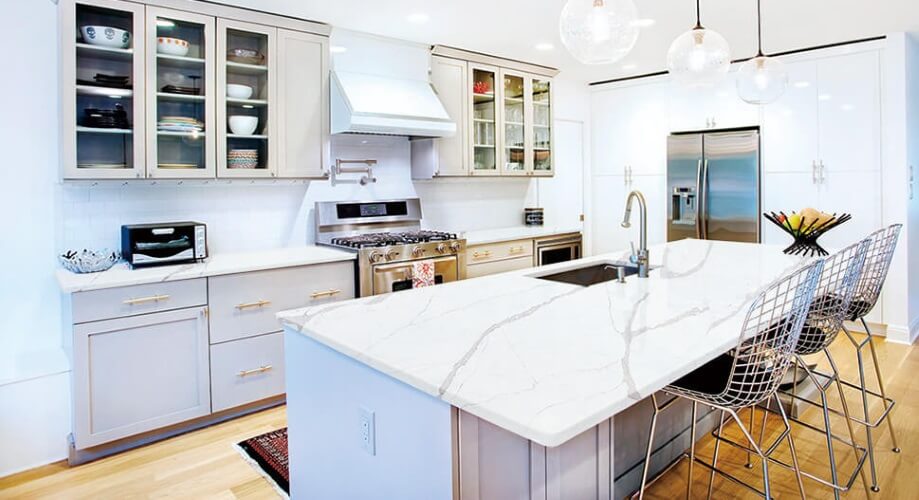
IMG – Teltos Calacatta Borghini By Epsilon Stone
If you’re after practicality and something simple and easy to clean, quartz is the right choice for you. Engineered Quartz is Australia’s most popular kitchen bench top materials for new home builds and bathroom vanity units. It comes in an array of colours, styles, price points and designs and isn’t as expensive as natural stone and far cheaper than porcelain. Once upon a time, the veined styles of quartz you see above thanks to our friends at Epsilon Stone were almost as expensive as their natural counterparts, but now with dramatic advances in technology and the quality of the quartz materials used, engineered stone rightfully stands atop of the podium as Australia’s most used kitchen bench top material.
The fact that it comes out of the box (so to speak) stain, acid and heat-resistant makes it a fantastic option for those who treat their kitchen as the centrepieces of the home. A place to socialise, cook and create without the need to worry about of constant upkeep and maintenance. It’s an ideal choice for those on the go, or for families who don’t have the time to constantly be keeping it maintained.
However, like most stone types, it isn’t resistant to chipping and the more popular brands and styles are more costly to purchase. (Although other brands like Epsilon Stone are bucking this expensive trend) and even with the more expensive styles on offer, how much are you willing to pay for convenience and style?
The PROS Of Engineered Quartz
- It’s surprisingly affordable for most styles
- Stain, acid, liquid and scratch resistant
- Production quality has improved dramatically in the last 5 years
- It is the most popular kitchen benchtop material on the market
- Great for those who don’t have time to maintain constantly
- Tonnes of variety and brands to choose from
The CONS Of Engineered quartz
- With a lot of competition comes a lot more to choose from. Which can become confusing
- It isn’t resistant to chipping and does still need to be treated with respect
- Some brands can be more costly than others, even though the material is almost identical
Price: $$$
Durability: 9/10
Ease Of Maintenance: 9/10
3/ Engineered Quartz

IMG – Teltos Calacatta Borghini By Epsilon Stone
If you’re after practicality and something simple and easy to clean, quartz is the right choice for you. Engineered Quartz is Australia’s most popular kitchen bench top materials for new home builds and bathroom vanity units. It comes in an array of colours, styles, price points and designs and isn’t as expensive as natural stone and far cheaper than porcelain. Once upon a time, the veined styles of quartz you see above thanks to our friends at Epsilon Stone were almost as expensive as their natural counterparts, but now with dramatic advances in technology and the quality of the quartz materials used, engineered stone rightfully stands atop of the podium as Australia’s most used kitchen bench top material.
The fact that it comes out of the box (so to speak) stain, acid and heat-resistant makes it a fantastic option for those who treat their kitchen as the centrepieces of the home. A place to socialise, cook and create without the need to worry about of constant upkeep and maintenance. It’s an ideal choice for those on the go, or for families who don’t have the time to constantly be keeping it maintained.
However, like most stone types, it isn’t resistant to chipping and the more popular brands and styles are more costly to purchase. (Although other brands like Epsilon Stone are bucking this expensive trend) and even with the more expensive styles on offer, how much are you willing to pay for convenience and style?
The PROS Of Engineered Quartz
- It’s surprisingly affordable for most styles
- Stain, acid, liquid and scratch resistant
- Production quality has improved dramatically in the last 5 years
- It is the most popular kitchen benchtop material on the market
- Great for those who don’t have time to maintain constantly
- Tonnes of variety and brands to choose from
The CONS Of Engineered quartz
- With a lot of competition comes a lot more to choose from. Which can become confusing
- It isn’t resistant to chipping and does still need to be treated with respect
- Some brands can be more costly than others, even though the material is almost identical
Price: $$$
Durability: 9/10
Ease Of Maintenance: 9/10
4/ Porcelain – A Newcomer Making Big Waves In the Market..
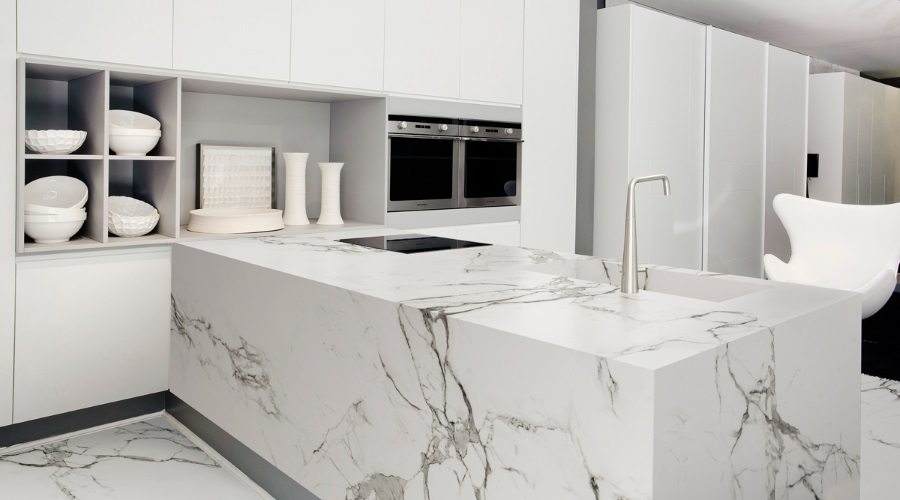
IMG – Dekton Porcelain by Consentino
Porcelain is a relatively new option to consider, but with it’s hefty price tags come some hefty benefits, a number of which you won’t find with it’s more affordable stone counterparts. In the last few years alone, however, the price has dropped and will most likely continue to drop as technology advances and manufacturing costs decrease, similar to what we saw with the introduction of engineered quartz many year ago.
It’s lightweight, you won’t need to seal it and it’s available in large slab sizes. It’s versatile too, you can use porcelain sheets for furniture, flooring and in outdoor areas and thanks to patterns being printed on the surface of the material, is available in a wide range of styles and looks.
However, the thickness, brittle nature and difficulty in fabricating make porcelain a material many stonemasons won’t handle due to the increased risk of damage, cutting, transporting and installing it. Although, it is a fantastic choice if done right, but the right stonemason must be considered, one with appropriate tools for the job and one that is certified by the company supplying the materials. This means the stonemason has the right equipment (often a waterjet) and has been trained by the company on the best practice for manufacturing, transporting and installing the porcelain itself.
The PROS Of Porcelain
- Stain, acid, liquid, heat, fire and scratch resistant
- Production price is decreasing and so is the price
- Lightweight for outdoor cladding, splashbacks and benchtops
- Even though the surface is printed, the quality of the prints are improving quickly
- Can be used outdoors in direct sunlight.
The CONS Of Porcelain
- Almost as expensive (if not moreso) than most natural and even granite products
- Due to it’s thickness (6,8,10 & 12mm) it’s incredibly susceptible to damage
- Once fractured, chipped or cracked, the entire slab is useless and can’t be repaired
- Many stonemasons will not work with it
- Still only provided by a few companies around Australia
Price: $$$$$
Durability: 7/10
Ease of Maintenance: 9/10
4/ Porcelain

IMG – Dekton Porcelain by Consentino
Porcelain is a relatively new option to consider, but with it’s hefty price tags come some hefty benefits, a number of which you won’t find with it’s more affordable stone counterparts. In the last few years alone, however, the price has dropped and will most likely continue to drop as technology advances and manufacturing costs decrease, similar to what we saw with the introduction of engineered quartz many year ago.
It’s lightweight, you won’t need to seal it and it’s available in large slab sizes. It’s versatile too, you can use porcelain sheets for furniture, flooring and in outdoor areas and thanks to patterns being printed on the surface of the material, is available in a wide range of styles and looks.
However, the thickness, brittle nature and difficulty in fabricating make porcelain a material many stonemasons won’t handle due to the increased risk of damage, cutting, transporting and installing it. Although, it is a fantastic choice if done right, but the right stonemason must be considered, one with appropriate tools for the job and one that is certified by the company supplying the materials. This means the stonemason has the right equipment (often a waterjet) and has been trained by the company on the best practice for manufacturing, transporting and installing the porcelain itself.
The PROS Of Porcelain
- Stain, acid, liquid, heat, fire and scratch resistant
- Production price is decreasing and so is the price
- Lightweight for outdoor cladding, splashbacks and benchtops
- Even though the surface is printed, the quality of the prints are improving quickly
- Can be used outdoors in direct sunlight.
The CONS Of Porcelain
- Almost as expensive (if not moreso) than most natural and even granite products
- Due to it’s thickness (6,8,10 & 12mm) it’s incredibly susceptible to damage
- Once fractured, chipped or cracked, the entire slab is useless and can’t be repaired
- Many stonemasons will not work with it
- Still only provided by a few companies around Australia
Price: $$$$$
Durability: 7/10
Ease of Maintenance: 9/10
4/ Natural Marble – Rugged, Raw and Incredibly Beautiful

IMG – Carrara marble installation by Cos Interiors & Aristocratic Stone (Photo my Emily Bartlett Photography)
Marble is a natural stone like granite, suitable for a top-of-the-range kitchen if price is no concern, although pricing is still relatively competitive compared to what it once way. Keep in mind it’s delicate and needs to be cared for correctly to keep it properly maintained. Marble is more porous than granite, so sealing and ongoing maintenance is a must to keep its surface as beautiful as the day it was originally installed. However, this is a small price to pay when you look at the absolutely stunning beauty that natural earth-created formations that you will find in a great piece of natural marble like the well known carrara’s and calacatta’s that we see so often.
As with all natural things from the Earth, the styles and colours of natural marble are very hard to 100% replicate and each slabs comes unique to the next, but can be perfectly book matched to create a stunning look, like the kitchen install above for award winning cabinet Melbourne cabinet maker, Cos Interiors.
A true stunner is natural marble and with more affordable versions like engineered quartz by Epsilon Stone, (an Australian first product), the price is becoming more affordable for every day kitchen lovers, with styles that will stand the test of time.
The PROS Of Natural Marble
- Each piece is unique and hard to replicate by man
- Can increase the value of your home when used in kitchens and bathrooms
- Screams elegance and sophistication
- Has become more affordable over the years
- 99% of stonemasons will work with it, unlike porecelain
The CONS Of Natural Marble
- Production rates will eventually decrease as the years go by
- Can be hard to find the “perfect piece” as there are a lot of styles
- Requires more maintenance
- Can only be used indoors and not in direct sunlight unlike granite
Price: $$$$
Durability: 9/10
Ease of Maintenance: 7/10
4/ Natural & Engineered Marble

Carrara marble install by Cos Interiors & Aristocratic Stone (Photo my Emily Bartlett Photography)
Marble is a natural stone like granite, suitable for a top-of-the-range kitchen if price is no concern, although pricing is still relatively competitive compared to what it once way. Keep in mind it’s delicate and needs to be cared for correctly to keep it properly maintained. Marble is more porous than granite, so sealing and ongoing maintenance is a must to keep its surface as beautiful as the day it was originally installed. However, this is a small price to pay when you look at the absolutely stunning beauty that natural earth-created formations that you will find in a great piece of natural marble like the well known carrara’s and calacatta’s that we see so often.
As with all natural things from the Earth, the styles and colours of natural marble are very hard to 100% replicate and each slabs comes unique to the next, but can be perfectly book matched to create a stunning look, like the kitchen install above for award winning cabinet Melbourne cabinet maker, Cos Interiors.
A true stunner is natural marble and with more affordable versions like engineered quartz by Epsilon Stone, (an Australian first product), the price is becoming more affordable for every day kitchen lovers, with styles that will stand the test of time.
The PROS Of Natural Marble
- Each piece is unique and hard to replicate by man
- Can increase the value of your home when used in kitchens and bathrooms
- Screams elegance and sophistication
- Has become more affordable over the years
- 99% of stonemasons will work with it, unlike porecelain
The CONS Of Natural Marble
- Production rates will eventually decrease as the years go by
- Can be hard to find the “perfect piece” as there are a lot of styles
- Requires more maintenance
- Can only be used indoors and not in direct sunlight unlike granite
So there you have it, a complete guide on the 5 most common benchtop materials currently in Australian homes and we hope this has made the choice just that little bit easier for you for your next stone project.
Still looking for a bit more info? Sure! We love to help, so don’t be afraid to reach out to the friend, family owned team at Aristocratic Stone today for more.
Email: info@aristocraticstone.com
Looking for a No Obligation Free Quote?
We’re not in the business of harassing you after you submit your free quote request and if you’re looking for a local stonemason who can provide the job on time and on budget, contact us today!

CONTACT US TODAY
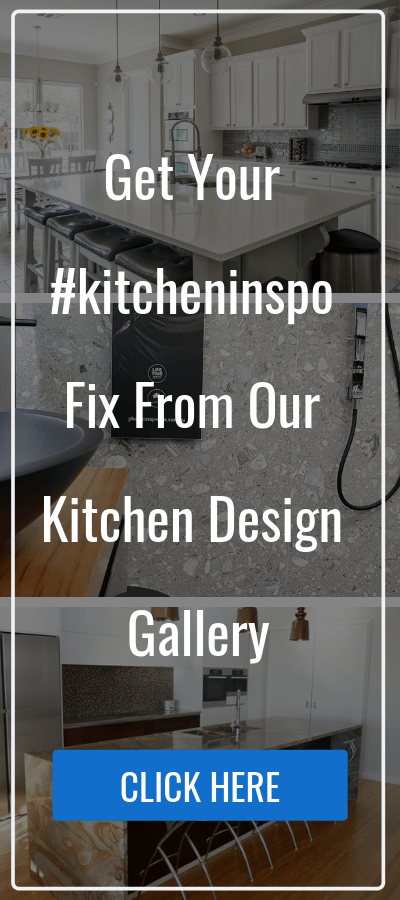

For over 20
We Work With
Marble
Engineered Stone
Granite
Travertine
Limestone & Onyx
Opening Hours
Monday: 8:00am - 4:00pm
Tuesday: 8:00am - 4:00pm
Wednesday: 8:00am - 4:00pm
Thursday: 8:00am - 4:00pm
Friday: 8:00am - 4:00pm
Saturday: By Appointment

